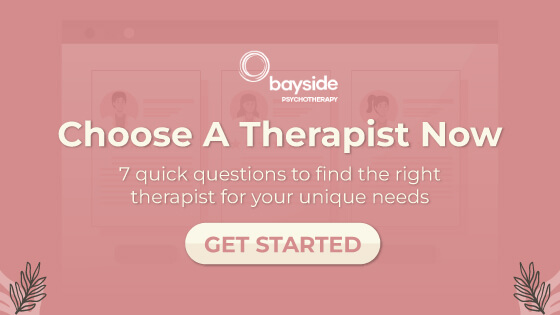
What is Gambling Addiction?
Difficulties with gambling can profoundly impact various areas of life including work, finances, relationships with others and of course, your relationship with yourself. If you are struggling to stop or reduce your gambling, it may be crucial to seek help from a professional therapist or psychologist.
Individuals who engage in repeated gambling behaviour may experience significant distress or impairment encompassing a need to gamble with progressively higher amounts of money to feel excited and may feel irritable or edgy when trying to stop or reduce their gambling behaviour. At times individuals may attempt to cease or reduce their gambling patterns but are unsuccessful or spend lots of time fantasising or thinking about gambling activities. Gambling can begin to be a way to try and manage distress and may lead to financial difficulties and a distorted perception regarding the severity of one’s gambling difficulty. Sadly it may lead to financial stress and job or relationship loss.
Individuals initially hooked in by the thrill of the win may then be drawn into a pattern of trying to recover one’s losses by continuing to gamble, often with increasingly higher amounts of money. Gambling can affect individuals from as early as adolescence and tends to have a gradual onset, although females are more likely to display a rapid escalation of behaviours compared to men.
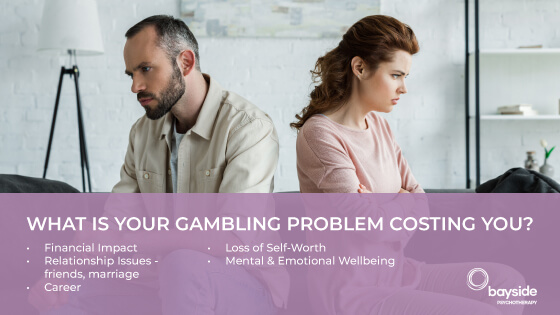
What is your Gambling Addiction Costing you?
Friends, relationships, your marriage, issues with your career, loss of your self-worth? Whether it’s poker, pokies, scratchy tickets, sports, horses, you may be able to get help for gambling addiction and claim your life back. The dizzying thrill of gambling is short-lived at best, and the reality of self-destruction is sobering.
The trained therapists (psychologist, psychotherapist, hypnotherapists) at Bayside Psychotherapy will endeavour to help you start working on your difficulties with gambling addiction.
Research studies exploring effective counselling and therapy interventions for gambling are continuing. While there is no strong evidence to support a specific therapeutic approach is effective for the treatment of gambling, current research suggests cognitive behaviour therapy (CBT) principles and motivational interviewing (MI) may be helpful. CBT involves exploring the links between thoughts, emotions and actions and involves a collaborative approach to help identify how thought patterns and chains of behaviours and decisions may lead to more vulnerability to maladaptive behaviours and coping strategies. MI involves a joint process between client and clinician to explore consequences of unhelpful behaviours and support a gentle change process that is guided by the desires of the client.
We endeavour to help stop your gambling addiction from continuing to dictate your every move and harming your relationships and robbing you of a financial future.
Call us on (03) 9557 9113 to book your confidential appointment. You can also book an appointment by using our online booking form for online appointments. Or, if you prefer, you can use this booking form here for an in-clinic session.
Self-hypnosis may also work well when used in conjunction with counselling. You can download our Gambling Addiction Self Hypnosis recording from our website.
Let’s work together to see if we may be able to help you work on your gambling problems.
Gambling Addiction Counselling – Frequently Asked Questions
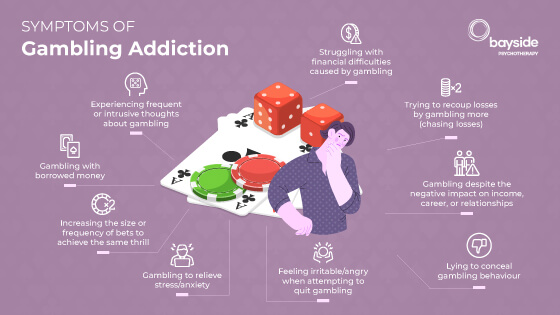
What are the symptoms of gambling addiction?
Here are some symptoms of gambling addiction:
- Experiencing frequent or intrusive thoughts about gambling
- Gambling with borrowed money
- Increasing the size or frequency of bets to achieve the same thrill
- Feeling irritable/angry when attempting to quit gambling
- Trying to recoup losses by gambling more (chasing losses)
- Gambling despite the negative impact on income, career, or relationships
- Lying to conceal gambling behaviour
- Gambling to relieve stress/anxiety
- Struggling with financial difficulties caused by gambling
Do I Have a Problem With Gambling?
Gambling Disorder, also known as “gambling addiction” and “compulsive gambling”, creates an uncontrollable urge to keep gambling despite knowing the destructive consequences it’s creating. The more a person gambles, the worse their life becomes. Gambling disorder is found in all cultures and crosses social boundaries, affecting the rich and the poor from all walks of life. It’s estimated that 2% to 4% of people who gamble will suffer its effects.
Do you chase your losses by trying to win back money you’ve already lost? Do you find that you only stop gambling when you run out of money? Do you hide your gambling habits from family, friends and co-workers? Do you feel regret after gambling? If so, you may have a gambling problem.
Why Is It So Hard to Stop Gambling?
In many, gambling stimulates the brain’s reward system, much like drugs or alcohol, which can lead to an addiction. And, just like any addiction, it’s hard to stop. If you suffer from a Gambling Disorder, you most likely can’t control the impulse to gamble, no matter what the negative consequences are.
Compulsive gambling can also lead to debt, which creates more of an urge to gamble as you chase the wins – it’s a vicious cycle that’s hard to stop. However, you have the potential to get help with your addiction from one of our trained therapists!
Book an appointment online to attend our clinic for a face-to-face or online session via Skype, Zoom or similar. Your call is completely confidential, and there’s absolutely no obligation.
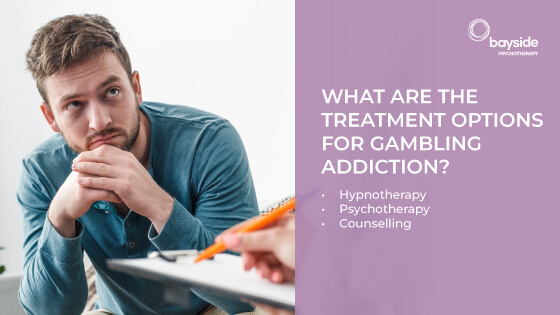
What Gambling Treatment Processes Are There at Bayside Psychotherapy?
Gambling treatment options vary here at Bayside Psychotherapy. Your progress dictates the direction we will take together. By meeting with you for an initial consultation, your therapist will endeavour to make an action plan that’ll work with you. If, after a few sessions, your therapist doesn’t see things moving in the right direction, they may alter treatment options that may help you accelerate results. By working together, you may be offered multiple treatment options tailored to your specific situation.
How Long Will Gambling Treatment Take?
Gambling treatment timeframes vary from individual to individual. Our therapists work with you, but your willingness to participate in your treatment is a critical factor. There may be more than one attempt at finding a viable treatment option for you but rest assured that your psychotherapist will work with you to help you potentially overcome your gambling addiction. Consider also downloading a recommended Gambling Addiction Hypnosis recording, to complement treatments in between sessions.
Need to start therapy for gambling and unsure what service to book?
How to overcome gambling addiction?
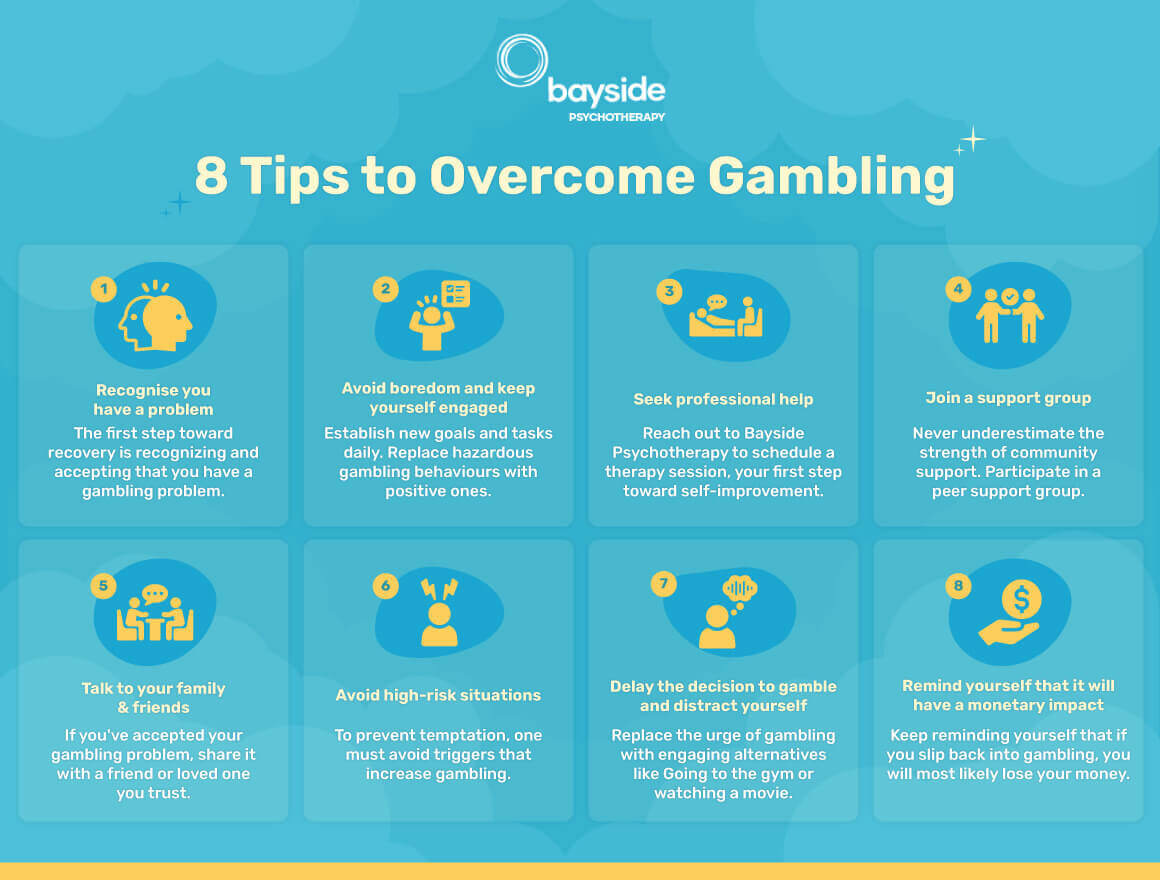
Here are some tips on overcoming gambling addiction:
- Recognise you have a problem
- Avoid boredom
- Seek professional help
- Join a support group
- Talk to your family & friends
- Avoid high-risk situations
- Delay the decision to gamble
- Remind yourself about the financial impact
What can I expect during the first counselling session for gambling addiction?
Expect a safe open space to speak and get off your chest whatever has been on your mind. Discuss a treatment plan, how many sessions and methods are used to addresse urges to gamble.
Is gambling addiction counselling confidential and judgment-free?
While sessions are confidential, if you have a Mental Health Care Plan with Adam or Natalie they are required to liaise with your referring GP. Moreover, serious risk to self/other is a limit to confidentiality. The role of therapist is not to judge. Most people experiencing problem gambling have already experienced their share of criticism (from self/other).
What makes professional gambling counselling more effective than self-help methods?
Every human has blind spots and areas that they don’t think are important or want to address. It’s often those painful thoughts, feelings and ideas and conflicts that sustain problem gambling.
Enquire by calling (03) 9557 9113 or book an appointment online to attend our clinic for a face-to-face or online session.
Get help choosing the therapist for you
Note: This information is informative only and is not to be used for diagnosis or substitution of appropriate assessment and/or treatment by a registered practitioner. Information on this page and our entire site should not be construed as implying that our therapists are specialists in treating any condition whatsoever. While some of our therapists may have experience working with people suffering from a specific condition, not all of our therapists do. We do not guarantee any particular level of performance, cure or management of symptoms. Each case is unique and responds differently with collaboration between client and therapist being crucial. Always seek an appropriate assessment from a qualified professional such as a GP, psychiatrist, clinical psychologist or social worker especially if you are acutely distressed.
Here is a blog written on this topic that you might find useful:
Reception Phone Hours
- – Monday 8:30am to 5:30pm
- – Tuesday 8:30am to 5:30pm
- – Wednesday 8:30am to 5:30pm
- – Thursday 8:30am to 5:30pm
- – Friday 8:30am to 5:30pm
Closed on public holidays
Choose your own date and time for an online or in-clinic session
Therapist Hours
- – Monday 8:00am to 8:00pm
- – Tuesday 8:30am to 8:00pm
- – Wednesday 8:30am to 8:00pm
- – Thursday 8:30am to 8:00pm
- – Friday 8:30am to 8:00pm
- – Saturday 8:00am to 6:00pm
Closed on public holidays

